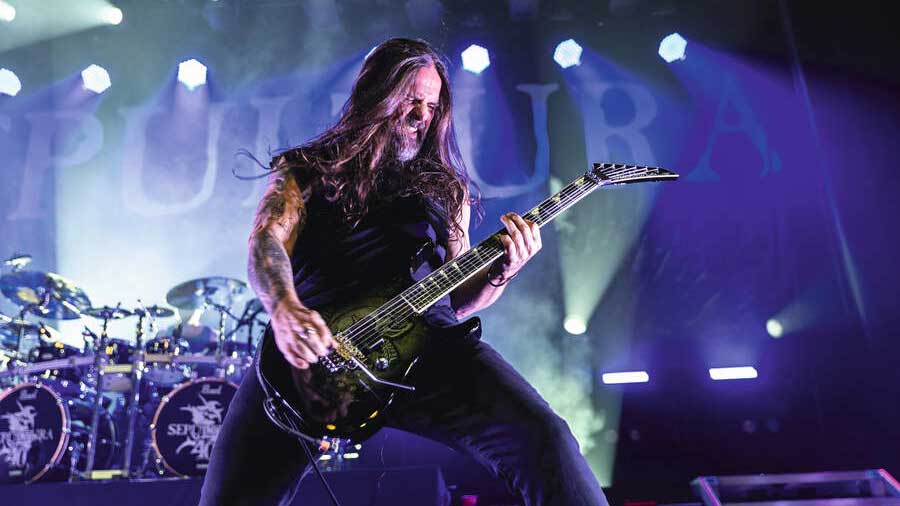
Sepultura were formed in Belo Horizonte, Brazil in 1984 by Calavera brothers Max (guitar, vocals) and Igor (drums). The early 90s saw them became one of the world’s foremost extreme metal bands, and although the Cavaleras both departed – Max to form Soulfly in ’96, Igor a decade later – Sepultura refused to die.
Guitarist Andreas Kisser, a member since 1987, explains why in their fortieth-anniversary year it’s time to undergo what the band term “euthanasia, the right to a dignified death”.

Why are Sepultura “departing via a conscious and planned death” on this farewell tour?
There were a few factors, including the fortieth anniversary. Surviving the pandemic gave us new perspective, and then two years ago my wife passed away from cancer. It made me realise that dying can bring new possibilities for life. Live in the present, there might not be a tomorrow. Also, we had made a great album [Quadra, 2020], so why not end on a high? Dying can be great [laughs].
Sepultura’s initial success came very much against the odds. There were language difficulties, and few really took the idea of a metal band from Brazil too seriously.
That [the spirit of the underdog] is probably our biggest legacy. Nobody thought we could break out of Brazil, with lyrics that nobody understood. But Max, Paulo [Jr, bassist], Igor and I were very persistent. Max got a ticket to go to New York and he took the Schizophrenia album with him, [the band signed to Roadrunner Records] and everything followed from there. We became an international band.
Across forty years, and fifteen albums that racked up three million sales, can you cherrypick a few high points from Sepultura’s career?
Thankfully there are a few, but for me it’s [that we are still here] today. There were so many challenges from inside the band and outside, including Napster and Spotify. Now it’s AI. Today is the best moment.
What were the points when the band reached rock bottom?
Lows and highs are an illusion. Playing for fifteen people can be amazing experience if you make the night of ten of those people. You know, when things went wrong, we learned. When things broke, we rebuilt.
After Max’s poisonous exit, Derrick Green joined in 1998. As a Black American he could scarcely have been any more different, and yet it worked.
That’s why it worked. Not like the guy [Arnel Pineda] who joined Journey [and sang just like Steve Perry]. The changes in Black Sabbath always fascinated me. I loved them all. When Derrick came, he had no attachment to Sepultura’s past. We started something fresh from completely new seeds. It was exciting.
Tell us about Sepultura’s connection with their British audience.
It was instant, from the first time we played in the UK at the Marquee with Sodom [in 1989]. That was crazy, man. People were there to see Sepultura, nobody cared about Sodom. We met Lemmy at the St Moritz nightclub, who was like a god to us. We were living the dream. It felt completely magical.
Sepultura’s UK tour gets underway shortly. What can people expect?
It’s the longest set of our career. We play something from every album, and we’ve brought back the Kaiowas jam [a Brazilian-inspired moment from 1993’s Chaos AD], with percussive instruments. We invite friends on stage and also people from the crowd – “Would you like to jam with us?” The look on their faces is amazing [laughs]. We’ve brought back Troops Of Doom [from 1986 debut Morbid Visions] alongside newer stuff. It’s a celebration.
Aren’t you recording the shows for a live album?
Yes. Every show is being recorded, and we’ve had the idea of releasing forty songs from forty different cities. We will also release a brand-new EP with four new songs.
Have Max and Igor given any indication of agreeing to take part?
No, but we are talking – between managers – and the possibility exists. There’s a long way to go.
How do you expect to feel after the final chords’ ring has died out?
The last song will be Roots [from the album of the same name], but right now I don’t want to think about it. All I can tell you is that we are very much at peace with this decision.
And in a couple of years, if the band were to change their mind?
If we came back in two, five or ten years, it’s nothing to do with what we are doing now. Anything’s possible. I like to keep it open.
You have already kind of answered this, but with a long list of bands including Slipknot, Korn and Gojira that admit to following your influence, is that Sepultura’s true legacy?
I think so. When Judas Priest played Brazil, Glenn Tipton told me that Sepultura had influenced them, and I replied: “Whaaat?” Back in 1984 it was impossible for a band like us to play outside of the country, but step by step we achieved our dreams. We had no videos of Slayer or Metallica to watch; we could only imagine the music we wanted to play. Maybe that’s why it worked?
With guests Jinger, Obituary and Jesus Piece, Sepultura’s UK and Ireland tour begins in Manchester on November 8. Check for tickets.







